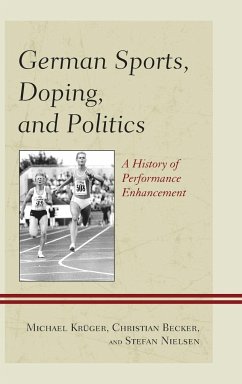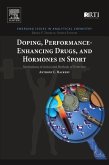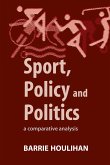Michael Krüger, Christian Becker, Stefan Nielsen
German Sports, Doping, and Politics
A History of Performance Enhancement
Michael Krüger, Christian Becker, Stefan Nielsen
German Sports, Doping, and Politics
A History of Performance Enhancement
- Gebundenes Buch
- Merkliste
- Auf die Merkliste
- Bewerten Bewerten
- Teilen
- Produkt teilen
- Produkterinnerung
- Produkterinnerung
This book examines doping in Germany, with primary attention given to West Germany, from 1950 to the present, including what societal, cultural, and institutional pressures arose after WWII to bring about such prevalence of doping in the country.
Andere Kunden interessierten sich auch für
![Joy of Sports, Revised Joy of Sports, Revised]() Michael NovakJoy of Sports, Revised20,99 €
Michael NovakJoy of Sports, Revised20,99 €![Doping, Performance-Enhancing Drugs, and Hormones in Sport Doping, Performance-Enhancing Drugs, and Hormones in Sport]() Anthony C. HackneyDoping, Performance-Enhancing Drugs, and Hormones in Sport59,99 €
Anthony C. HackneyDoping, Performance-Enhancing Drugs, and Hormones in Sport59,99 €![Sport, Policy and Politics Sport, Policy and Politics]() Barrie HoulihanSport, Policy and Politics223,99 €
Barrie HoulihanSport, Policy and Politics223,99 €![Understanding the Active Economy and Emerging Research on the Value of Sports, Recreation, and Wellness Understanding the Active Economy and Emerging Research on the Value of Sports, Recreation, and Wellness]() Understanding the Active Economy and Emerging Research on the Value of Sports, Recreation, and Wellness223,99 €
Understanding the Active Economy and Emerging Research on the Value of Sports, Recreation, and Wellness223,99 €![Power and Politics in World Athletics Power and Politics in World Athletics]() Jörg KriegerPower and Politics in World Athletics201,99 €
Jörg KriegerPower and Politics in World Athletics201,99 €![Sports, Their Organization and Administration Sports, Their Organization and Administration]() William Leonard HughesSports, Their Organization and Administration42,99 €
William Leonard HughesSports, Their Organization and Administration42,99 €![Sport Management Sport Management]() Rob WilsonSport Management21,99 €
Rob WilsonSport Management21,99 €-
-
-
This book examines doping in Germany, with primary attention given to West Germany, from 1950 to the present, including what societal, cultural, and institutional pressures arose after WWII to bring about such prevalence of doping in the country.
Hinweis: Dieser Artikel kann nur an eine deutsche Lieferadresse ausgeliefert werden.
Hinweis: Dieser Artikel kann nur an eine deutsche Lieferadresse ausgeliefert werden.
Produktdetails
- Produktdetails
- Verlag: Rowman & Littlefield Publishers
- Seitenzahl: 268
- Erscheinungstermin: 9. April 2015
- Englisch
- Abmessung: 235mm x 157mm x 20mm
- Gewicht: 590g
- ISBN-13: 9781442249202
- ISBN-10: 144224920X
- Artikelnr.: 42027311
- Herstellerkennzeichnung
- Libri GmbH
- Europaallee 1
- 36244 Bad Hersfeld
- gpsr@libri.de
- Verlag: Rowman & Littlefield Publishers
- Seitenzahl: 268
- Erscheinungstermin: 9. April 2015
- Englisch
- Abmessung: 235mm x 157mm x 20mm
- Gewicht: 590g
- ISBN-13: 9781442249202
- ISBN-10: 144224920X
- Artikelnr.: 42027311
- Herstellerkennzeichnung
- Libri GmbH
- Europaallee 1
- 36244 Bad Hersfeld
- gpsr@libri.de
Michael Krüger is professor of Physical Education and Sports History at the University of Muenster in Germany. He is council member of the International Society for the History of Physical Education and Sport (ISHPES). Christian Becker is a sports historian and publisher in Hildesheim, Germany. Stefan Nielsen is a historian and editor in Muenster, Germany.
Introduction - Basics and Problem Definition The Role of Doping in the
Relationship between Politics, Sporting Policies, and Sports Methodological
Basics: Sources and Documents State of the Art Scientific Debate on Doping
and Public Moralization Problems of Empirical Evaluation and Proving Doping
I. From Common Practice to Prohibition - the Beginnings of Doping and
Anti-Doping in German Sport of the 1950s and 1960s Introduction Sport in
the Federal Republic of Germany after the Second World War Structures and
Self-Perceptions of the German Federal Sports Organizations Sports Policy
Physical Health as a Common Objective - a Legitimation for State Sponsoring
Competitive Sports and National Representation: The Delayed Start - Germany
in the Context of International Sports Development The "Medicalization" of
Society and Sport and other Doping and Anti-Doping Issues Spread and
Development of Anti-Doping in the 1950s and 1960s Self-Concept and
Functions of German Sports Medicine Anti-Doping Policies in the 1950s and
1960s Doping Rules of Some Sports Federations The Role of State and
Government in Anti-Doping Policies Doping During the 1950s and 1960s -
Intermediate Results II. Cold War and the Climax of Doping in Germany
- From the Munich Olympics of 1972 via Montreal 1976 to the Introduction of
Out-of-Competition Controls in the 1980s Introduction The 1972 Olympic
Games of Munich and Their Importance for the Development of Doping and
Anti-Doping in Germany Anti-doping Politics of the IOC in the 1970s Sport
Politics, Doping and Anti-Doping in West Germany Interim Results Doping and
Anti-Doping up to the Olympic Games of Montreal in 1976 Problems in
Preventing Anabolic Steroids in Sport Anabolic Steroids, their Prevalence
in Top Level Sport and Doping Controls The Doping Games of Montreal 1976:
"Kolbe Injection" and "Air Clyster Scandal" - and their Political
Consequences Political Contextualization of Doping and Anti-Doping in the
1970s and 1980s German Secret Services on Doping Doping and West German
Sports Medicine Adaptation by West German Sport Organizations Consequences
of State and Sport Policies - the "Grundsatzerklärung für den Spitzensport"
of 1977 Doping Enhancement in West German Sport Doping and Anti-Doping
Policies between 1977 and 1989 The Case of Birgit Dressel Preventive
Controls Anti-Doping: Some Facts and Problems A Doubtful Research Project:
The Study of Rejuvenation/ Regeneration by Means of Testosterone
Introduction of Out-of-Competition Controls Interim Results - Changes to
Doping and Anti-Doping Policies during the 1970s and 1980s III. Doping and
Anti-Doping in the Process of German Reunification State and Sport, Doping
and Anti-Doping in West Germany before 1990 Revelations of Doping by the
German Media after Unification Responses from Sport and Politics The
Parliament Veto: Budget Cut in 1991/92 European and International
Perspectives The Case of Dieter Baumann - a Blow in the Fight against
Doping Interim Results: Reunification, Rehabilitation and New Beginnings
International Strategies of Anti-Doping - Germany on the Path to the World
Anti-Doping Agency (WADA) The Establishment of an International Political
Anti-Doping Regime From Lausanne to the WADA WADA as the New Center of the
International Fight against Doping Effects of the International Anti-Doping
Movement on German Anti-Doping Policies: From the Anti-Doping Commission of
the German Sport Federation (DSB) to the National Anti-Doping Agency (NADA)
German Anti-Doping Crisis of 2007 The Debate on an Anti-Doping Law Interim
Results: Doping in the Context of Sport, State and Society Conclusion The
German Story of Doping - a Relevant Element of the Overall Sports Process
Explanations for the Doping and Anti-Doping Process Relevance of the Cold
War Changes of the Relationship between State and Sport Bibliography
Chronology List of abbreviations Index About the Authors
Relationship between Politics, Sporting Policies, and Sports Methodological
Basics: Sources and Documents State of the Art Scientific Debate on Doping
and Public Moralization Problems of Empirical Evaluation and Proving Doping
I. From Common Practice to Prohibition - the Beginnings of Doping and
Anti-Doping in German Sport of the 1950s and 1960s Introduction Sport in
the Federal Republic of Germany after the Second World War Structures and
Self-Perceptions of the German Federal Sports Organizations Sports Policy
Physical Health as a Common Objective - a Legitimation for State Sponsoring
Competitive Sports and National Representation: The Delayed Start - Germany
in the Context of International Sports Development The "Medicalization" of
Society and Sport and other Doping and Anti-Doping Issues Spread and
Development of Anti-Doping in the 1950s and 1960s Self-Concept and
Functions of German Sports Medicine Anti-Doping Policies in the 1950s and
1960s Doping Rules of Some Sports Federations The Role of State and
Government in Anti-Doping Policies Doping During the 1950s and 1960s -
Intermediate Results II. Cold War and the Climax of Doping in Germany
- From the Munich Olympics of 1972 via Montreal 1976 to the Introduction of
Out-of-Competition Controls in the 1980s Introduction The 1972 Olympic
Games of Munich and Their Importance for the Development of Doping and
Anti-Doping in Germany Anti-doping Politics of the IOC in the 1970s Sport
Politics, Doping and Anti-Doping in West Germany Interim Results Doping and
Anti-Doping up to the Olympic Games of Montreal in 1976 Problems in
Preventing Anabolic Steroids in Sport Anabolic Steroids, their Prevalence
in Top Level Sport and Doping Controls The Doping Games of Montreal 1976:
"Kolbe Injection" and "Air Clyster Scandal" - and their Political
Consequences Political Contextualization of Doping and Anti-Doping in the
1970s and 1980s German Secret Services on Doping Doping and West German
Sports Medicine Adaptation by West German Sport Organizations Consequences
of State and Sport Policies - the "Grundsatzerklärung für den Spitzensport"
of 1977 Doping Enhancement in West German Sport Doping and Anti-Doping
Policies between 1977 and 1989 The Case of Birgit Dressel Preventive
Controls Anti-Doping: Some Facts and Problems A Doubtful Research Project:
The Study of Rejuvenation/ Regeneration by Means of Testosterone
Introduction of Out-of-Competition Controls Interim Results - Changes to
Doping and Anti-Doping Policies during the 1970s and 1980s III. Doping and
Anti-Doping in the Process of German Reunification State and Sport, Doping
and Anti-Doping in West Germany before 1990 Revelations of Doping by the
German Media after Unification Responses from Sport and Politics The
Parliament Veto: Budget Cut in 1991/92 European and International
Perspectives The Case of Dieter Baumann - a Blow in the Fight against
Doping Interim Results: Reunification, Rehabilitation and New Beginnings
International Strategies of Anti-Doping - Germany on the Path to the World
Anti-Doping Agency (WADA) The Establishment of an International Political
Anti-Doping Regime From Lausanne to the WADA WADA as the New Center of the
International Fight against Doping Effects of the International Anti-Doping
Movement on German Anti-Doping Policies: From the Anti-Doping Commission of
the German Sport Federation (DSB) to the National Anti-Doping Agency (NADA)
German Anti-Doping Crisis of 2007 The Debate on an Anti-Doping Law Interim
Results: Doping in the Context of Sport, State and Society Conclusion The
German Story of Doping - a Relevant Element of the Overall Sports Process
Explanations for the Doping and Anti-Doping Process Relevance of the Cold
War Changes of the Relationship between State and Sport Bibliography
Chronology List of abbreviations Index About the Authors
Introduction - Basics and Problem Definition The Role of Doping in the
Relationship between Politics, Sporting Policies, and Sports Methodological
Basics: Sources and Documents State of the Art Scientific Debate on Doping
and Public Moralization Problems of Empirical Evaluation and Proving Doping
I. From Common Practice to Prohibition - the Beginnings of Doping and
Anti-Doping in German Sport of the 1950s and 1960s Introduction Sport in
the Federal Republic of Germany after the Second World War Structures and
Self-Perceptions of the German Federal Sports Organizations Sports Policy
Physical Health as a Common Objective - a Legitimation for State Sponsoring
Competitive Sports and National Representation: The Delayed Start - Germany
in the Context of International Sports Development The "Medicalization" of
Society and Sport and other Doping and Anti-Doping Issues Spread and
Development of Anti-Doping in the 1950s and 1960s Self-Concept and
Functions of German Sports Medicine Anti-Doping Policies in the 1950s and
1960s Doping Rules of Some Sports Federations The Role of State and
Government in Anti-Doping Policies Doping During the 1950s and 1960s -
Intermediate Results II. Cold War and the Climax of Doping in Germany
- From the Munich Olympics of 1972 via Montreal 1976 to the Introduction of
Out-of-Competition Controls in the 1980s Introduction The 1972 Olympic
Games of Munich and Their Importance for the Development of Doping and
Anti-Doping in Germany Anti-doping Politics of the IOC in the 1970s Sport
Politics, Doping and Anti-Doping in West Germany Interim Results Doping and
Anti-Doping up to the Olympic Games of Montreal in 1976 Problems in
Preventing Anabolic Steroids in Sport Anabolic Steroids, their Prevalence
in Top Level Sport and Doping Controls The Doping Games of Montreal 1976:
"Kolbe Injection" and "Air Clyster Scandal" - and their Political
Consequences Political Contextualization of Doping and Anti-Doping in the
1970s and 1980s German Secret Services on Doping Doping and West German
Sports Medicine Adaptation by West German Sport Organizations Consequences
of State and Sport Policies - the "Grundsatzerklärung für den Spitzensport"
of 1977 Doping Enhancement in West German Sport Doping and Anti-Doping
Policies between 1977 and 1989 The Case of Birgit Dressel Preventive
Controls Anti-Doping: Some Facts and Problems A Doubtful Research Project:
The Study of Rejuvenation/ Regeneration by Means of Testosterone
Introduction of Out-of-Competition Controls Interim Results - Changes to
Doping and Anti-Doping Policies during the 1970s and 1980s III. Doping and
Anti-Doping in the Process of German Reunification State and Sport, Doping
and Anti-Doping in West Germany before 1990 Revelations of Doping by the
German Media after Unification Responses from Sport and Politics The
Parliament Veto: Budget Cut in 1991/92 European and International
Perspectives The Case of Dieter Baumann - a Blow in the Fight against
Doping Interim Results: Reunification, Rehabilitation and New Beginnings
International Strategies of Anti-Doping - Germany on the Path to the World
Anti-Doping Agency (WADA) The Establishment of an International Political
Anti-Doping Regime From Lausanne to the WADA WADA as the New Center of the
International Fight against Doping Effects of the International Anti-Doping
Movement on German Anti-Doping Policies: From the Anti-Doping Commission of
the German Sport Federation (DSB) to the National Anti-Doping Agency (NADA)
German Anti-Doping Crisis of 2007 The Debate on an Anti-Doping Law Interim
Results: Doping in the Context of Sport, State and Society Conclusion The
German Story of Doping - a Relevant Element of the Overall Sports Process
Explanations for the Doping and Anti-Doping Process Relevance of the Cold
War Changes of the Relationship between State and Sport Bibliography
Chronology List of abbreviations Index About the Authors
Relationship between Politics, Sporting Policies, and Sports Methodological
Basics: Sources and Documents State of the Art Scientific Debate on Doping
and Public Moralization Problems of Empirical Evaluation and Proving Doping
I. From Common Practice to Prohibition - the Beginnings of Doping and
Anti-Doping in German Sport of the 1950s and 1960s Introduction Sport in
the Federal Republic of Germany after the Second World War Structures and
Self-Perceptions of the German Federal Sports Organizations Sports Policy
Physical Health as a Common Objective - a Legitimation for State Sponsoring
Competitive Sports and National Representation: The Delayed Start - Germany
in the Context of International Sports Development The "Medicalization" of
Society and Sport and other Doping and Anti-Doping Issues Spread and
Development of Anti-Doping in the 1950s and 1960s Self-Concept and
Functions of German Sports Medicine Anti-Doping Policies in the 1950s and
1960s Doping Rules of Some Sports Federations The Role of State and
Government in Anti-Doping Policies Doping During the 1950s and 1960s -
Intermediate Results II. Cold War and the Climax of Doping in Germany
- From the Munich Olympics of 1972 via Montreal 1976 to the Introduction of
Out-of-Competition Controls in the 1980s Introduction The 1972 Olympic
Games of Munich and Their Importance for the Development of Doping and
Anti-Doping in Germany Anti-doping Politics of the IOC in the 1970s Sport
Politics, Doping and Anti-Doping in West Germany Interim Results Doping and
Anti-Doping up to the Olympic Games of Montreal in 1976 Problems in
Preventing Anabolic Steroids in Sport Anabolic Steroids, their Prevalence
in Top Level Sport and Doping Controls The Doping Games of Montreal 1976:
"Kolbe Injection" and "Air Clyster Scandal" - and their Political
Consequences Political Contextualization of Doping and Anti-Doping in the
1970s and 1980s German Secret Services on Doping Doping and West German
Sports Medicine Adaptation by West German Sport Organizations Consequences
of State and Sport Policies - the "Grundsatzerklärung für den Spitzensport"
of 1977 Doping Enhancement in West German Sport Doping and Anti-Doping
Policies between 1977 and 1989 The Case of Birgit Dressel Preventive
Controls Anti-Doping: Some Facts and Problems A Doubtful Research Project:
The Study of Rejuvenation/ Regeneration by Means of Testosterone
Introduction of Out-of-Competition Controls Interim Results - Changes to
Doping and Anti-Doping Policies during the 1970s and 1980s III. Doping and
Anti-Doping in the Process of German Reunification State and Sport, Doping
and Anti-Doping in West Germany before 1990 Revelations of Doping by the
German Media after Unification Responses from Sport and Politics The
Parliament Veto: Budget Cut in 1991/92 European and International
Perspectives The Case of Dieter Baumann - a Blow in the Fight against
Doping Interim Results: Reunification, Rehabilitation and New Beginnings
International Strategies of Anti-Doping - Germany on the Path to the World
Anti-Doping Agency (WADA) The Establishment of an International Political
Anti-Doping Regime From Lausanne to the WADA WADA as the New Center of the
International Fight against Doping Effects of the International Anti-Doping
Movement on German Anti-Doping Policies: From the Anti-Doping Commission of
the German Sport Federation (DSB) to the National Anti-Doping Agency (NADA)
German Anti-Doping Crisis of 2007 The Debate on an Anti-Doping Law Interim
Results: Doping in the Context of Sport, State and Society Conclusion The
German Story of Doping - a Relevant Element of the Overall Sports Process
Explanations for the Doping and Anti-Doping Process Relevance of the Cold
War Changes of the Relationship between State and Sport Bibliography
Chronology List of abbreviations Index About the Authors








